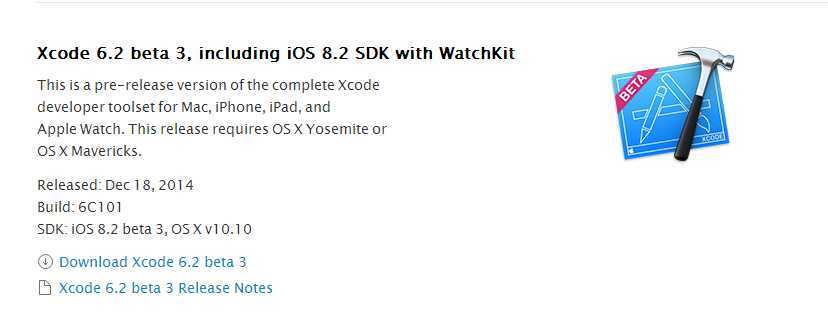标签:
Xcode 6.2 beta 3, including iOS 8.2 SDK with WatchKit
Xcode 6 introduces a radically new way to design and build software. Swift is an innovative new programming language for Cocoa and Cocoa Touch and, when combined with Xcode tools, makes programming a delightfully live experience. This same live experience permeates throughout Xcode 6. Live rendering within Interface Builder displays your hand-written UI code within the design canvas, instantly reflecting changes you type in code. And the new view debugger explodes all the UI layers into a 3D visualization, making it easy to understand how your interface is composed, and identify overlapping or clipping views. Watch the "What‘s New in Xcode 6" video

Xcode 6 has deep support for Swift throughout. It’s easy to create a brand new app using 100% Swift code, add new Swift code or frameworks to existing apps, and view documentation in either Swift, Objective-C, or both. All the popular affordances such as “Jump to Definition” or “Open Quickly” work equally well with Swift, and even Objective-C header definitions can be shown in Swift syntax.
Learn more about the Swift programming language

Playgrounds enable the interactive experience of a script language, even though Swift compiles to highly-optimized native code. Type a line of code and the result appears immediately. If your code runs through a loop, add that line of code to the timeline assistant editor to watch its progression. Display variables in a graph, inspect each step when drawing a view, or watch an animated SpriteKit scene. When you’ve perfected your code in the playground, simply move it into your project. Playgrounds documentation includes tutorials that you can open in a playground, providing an interactive worksheet for experimentation.
Xcode’s debugger includes an interactive version of the Swift language, known as the REPL (Read-Eval-Print-Loop). Use Swift syntax to evaluate and interact with your running app or write new code in a script-like environment. The REPL is available from within LLDB in Xcode’s console, or from Terminal.
Interface Builder now displays your custom objects at design time, appearing as they will when your app is run. When you update the code for your custom view, the Interface Builder design canvas updates automatically with the new look — no need to build and run. APIs let you add properties to the IB inspector for quick design time changes to your views, and you can even pre-populate the view with example data to get a more accurate feel for the interface.
Storyboards for iOS support UIKit size classes, so you can develop a single universal storyboard that behaves correctly on any iOS device. Choose unique behaviors for certain device sizes or orientations while keeping the majority of the interface consistent and easy to maintain. Interface Builder can preview any combination of device and orientation as you design the interface.
Debugging an app’s UI is now as simple as a single click to explode the paused app’s UI into a 3D rendering of each layer in the stack of views. Easily see why a view may be clipped or invisible, and inspect and debug constraints and other properties within the inspector. To fix the problem, select a view to quickly jump to its related code.
Xcode 6 includes other new debugging tools, such as debug gauges to monitor I/O usage and an enhanced iCloud gauge. The debug navigator shows even more useful information, including recorded stack frames and enqueued blocks.

The XCTest framework has been extended to support performance tests, and is fully integrated into Xcode and Xcode Server. Xcode will run your performance tests, letting you define a baseline performance metric. Each subsequent test run compares performance, displays the change over time, and alerts you to sudden regressions a code commit could introduce. Performance tests are tightly integrated into Xcode’s new logs UI that more clearly shows when test results change, alerting you to regressions in performance or functionality as you monitor the quality of your app.
Instruments now looks and works more like Xcode. The tracks of recorded data are given even more space, and configuration for how data is collected and viewed is managed in a unified inspector area. Instruments can even profile your XCTests.
Xcode 6.2 beta 3 下载地址:
http://yunpan.cn/cfUIxGWduvPKU 提取码: 91a0
Xcode 6.2 beta 3 太难下载!下载了,不敢独享
标签:
原文地址:http://www.cnblogs.com/spring286/p/4203768.html